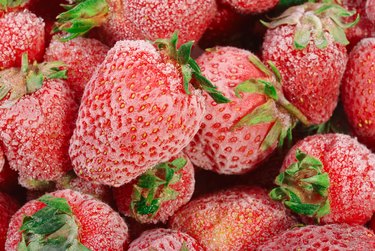
Berries are like the candy of the natural world — but they can go bad very quickly. Keeping a freezer stocked with frozen fruit like strawberries means you'll always have preserved, nutritious treats on hand, whether you're eating frozen fruit out of the bag or using thawed strawberries in recipes.
Tip
You can defrost frozen strawberries by moving them from the freezer to the refrigerator for approximately six to eight hours or by leaving them under cold running water for 30 minutes to one hour.
Video of the Day
Freezing Fruit for Anytime Use
The great part about stocking frozen fruit like strawberries is that you don't have to worry about their going bad the way you would with fresh strawberries. You can pick up a bag of frozen strawberries at the grocery store and keep it in the freezer until you need it. Montana State University explains that freezing stops the growth of bacteria and other microorganisms that cause spoilage, and fruit will retain its nutrients and flavor if frozen correctly.
Video of the Day
However, you can't use frozen fruit the exact same way you would use fresh fruit. That's because of the high water content these fruits contain. When they're frozen, the water expands. This ruptures the cell walls of the strawberries, so when they defrost, they can become soft and have trouble holding their shape.
But there are several ways around this, even if you're not cooking them and instead defrosting frozen berries for yogurt or eating frozen fruit out of the bag. You simply have to serve the strawberries when they are still partially frozen so they still have a little bit of shape to them.
Along the same lines, the National Center for Home Food Preservation notes that the ice crystals that remain in the partially thawed strawberries will make up for the softness the fruit would have otherwise.
Thawed Strawberry Recipes
The National Center for Home Food Preservation explains that you should keep frozen fruit in its package and either move it from the freezer to the fridge or set it under cold running water. If you defrost using the fridge method, make sure the temperature of the fridge is 40 degrees Fahrenheit or colder and the strawberries have six to eight hours to defrost. If you're going with cold water, set under water that is 70 degrees F or colder for 30 minutes to one hour.
If you plan to use these thawed strawberries for recipes, get them to be defrosted just enough that you can break them apart. Then you can use the strawberries in any recipe just as you would fresh strawberries. You might need to add a little water to prevent scorching. Use your thawed strawberries in recipes such as these mini creamy strawberry empanadas, where the strawberries get wrapped up in a crust and baked.
If a recipe specifies fresh strawberries, you will need to experiment a little. For example, the United States Department of Agriculture features a recipe for whole-grain strawberry pancakes that calls for sliced fresh strawberries. Per the recommendation of the National Center for Home Food Preservation, add a little bit less liquid or a little bit extra thickener to compensate for the syrup or juice that fruit is typically frozen in.
If you are serving or eating frozen fruit out of the bag, you can try dusting the strawberries with a little bit of confectioners' sugar to absorb some of their moisture.
Read more: 4 Major Reasons to Eat More Blueberries
Health Benefits of Strawberries
Strawberries are great to have readily available on hand — either fresh or frozen — because they taste great and are great for you. According to the Academy of Nutrition and Dietetics, studies show that most children don't get enough fruits and vegetables, but strawberries are an exception for picky eaters: More than half of kids between the ages of 7 and 9 named strawberries as their favorite fruit. These robust red berries are full of fiber, folate, vitamin C and potassium.
Scientific journals over the years have highlighted their many health benefits. A review published in June 2016 in Journal of Agricultural and Food Chemistry looked at studies on how strawberries fight inflammation and oxidation, and how their inclusion in a diet can prevent obesity, heart disease and cancer.
These are all great reasons that any family would be smart to keep frozen strawberries on hand, ready to defrost these berries for yogurt, incorporate them into pancakes or blend them up into a smoothie.
- National Center for Home Food Preservation: “General Freezing Information”
- Academy of Nutrition and Dietetics: “The Season for Strawberries”
- Journal of Agricultural and Food Chemistry: “Promising Health Benefits of the Strawberry: A Focus on Clinical Studies”
- USDA: "Whole-Grain Strawberry Pancakes"
- Montana State University Extension: "Freezing Fruit"